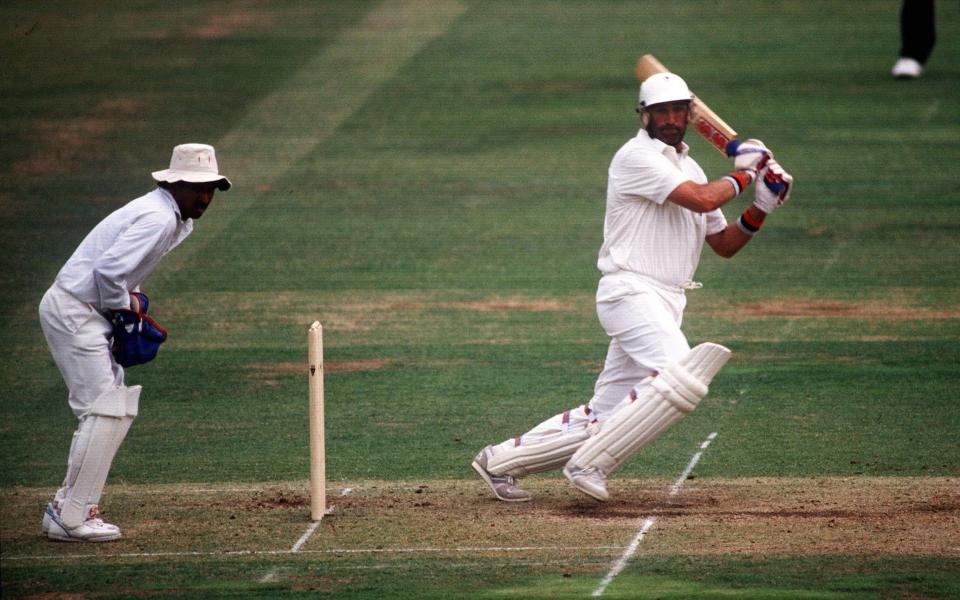Graham Gooch poses for our photographer in the chic London district of Fitzrovia, barely a six-hit from Lord’s. If he’s been looking great for seventy years, maybe it’s because he’s just returned from an appointment at Advanced Hair Studios, the bonce weaving experts he’s been promoting since the mid-1990s.
Maybe it’s unprofessional to say it, but the evergreen Gooch was my hero as a boy. As I looked at the county scores in the school library, I celebrated every time he steered Essex to victory over our great rivals: Middlesex and Nottinghamshire. Then, about ten years later, I cheered again Clarifying identified him as the most prolific batsman of all time.
And yet, despite those 67,000 runs, writers of the day spilled less ink on his majestic strokeplay than on his disconsolate body language, which once led to Ted Dexter declaring that Gooch had “the charisma of a wet fish.” A man with a well-hidden, dry sense of humor, he played this role as a cricketer. On the eve of his final test, a photographer asked him to smile, and he replied: “Can’t, it would spoil the image.”
What does Mr. Pragmatic think about England’s new-fangled “Bazball” tactic? The answer, as we sit at lunch, is nuanced. “It’s good to look at,” muses Gooch, as he drinks a portion of Cornish plaice and sourdough bread. (In typical fitness-conscious style, he doesn’t have bread in the house, but now compensates with the same appetite he once showed for “daddy hundreds.”)
“I am completely in favor of going out from ball one, setting the agenda and taking the initiative,” he continues. “My mentor at Essex was Keith Fletcher, who was successful in three-day cricket because he never let the game drift. And I was surprised that Australia had a sweeper at both ends on the first ball of the Ashes. They responded to the English plan before it had even begun.
Will there be a ‘but’? That certainly must be the case. As England batting coach in early 2010, Gooch once laid out Kevin Pietersen for a series of Bazball-style self-destructive dismissals. So it feels reassuring when he returns to his standby mode of graying common sense.
“You have to be smart sometimes,” he says. “In the second Ashes Test there was the short-ball fiasco. The score was 180 to one, and then it was as if we went out with a bag of balls and a glove and said, ‘Spread out, I’ll give you a few catches.’ And was it smart to reach 130 odd with our best player during the first test?
‘For me, Joe Root doesn’t play Bazball. And that’s right: you need a balance, a few players in the Alastair Cook/Geoffrey Boycott style and a few players in the Ian Botham/David Gower style. Because what you need is to present different problems to the opposition. Nowadays, most English players take the ball in the air because they were bred for Twenty20 cricket.”


Fans of 1990s cricket may be shocked to read this approving mention of Gower. Didn’t the two G’s fall out over Gower’s lazy jaunt to Adelaide during the 1990-91 Ashes? And were no questions asked in Parliament after Gooch left his enemy at home for an ill-fated tour of India two years later?
The answers are “yes” and “yes,” but Gooch has previously acknowledged he made a mistake in opposing Gower. Today the two men are good friends, even though during lunch Gooch again emphasized their temperamental contrasts.
“We recently did a theater tour together,” he explains, “and one afternoon we were talking about our approach to the game. I was a player who developed over twenty years. I changed my technique, worked on my fitness and thought differently about myself when I became captain. It just calmed the chimpanzee on my shoulder so that instead of thinking, “Am I going to do well today?” I thought ‘me shall do well today.” David was the opposite. “I understand where you’re coming from,” he told me. “But I’m afraid I was the same kind of player at the beginning of my career as I was at the end.”
Gooch insists that he no longer sees one approach as better than the other, and that “David was a brilliant batsman from start to finish – the best I have played with for England.” But it is Gooch’s inquisitive mentality, rather than Gower’s instinctive genius, that has proven more influential in the long run.
In particular, Gooch’s once signature stance—the bat raised like a periscope—has become standard practice for today’s Bazballers, completely eclipsing the boycott-style orthodoxy of pointing the toe toward the ground until the ball is released. In an unexpected twist, the innovation appears to have emerged from an early example of video analytics. After the 1978–79 Ashes, Gooch returned home to discover that his wife’s Aunt Grace had recorded two and a half months’ worth of TV highlights.


“Grace had bought one of the first VCRs,” he explains. “It was a huge machine, with tires as big as a book. In those days you never really saw yourself on TV. But I saw the way I was playing and I thought, ‘I can’t play like that, I’m falling over all the time.’ I knew I had to make a change for the 1979 season to get my eyes level. The only way I could feel comfortable was not to stand in the conventional way, but to lift the bat off the ground. He averaged 45 in the short England-Australia series of 1979-80, a significant improvement on 32 the previous winter.
Throughout his career, Gooch not only came up with this important innovation, but also a number of oft-repeated zingers, including “Who writes your scripts?” (to Ian Botham, who had just taken a wicket with his first ball back after a drugs ban), and “If it had been a cheese sandwich it would never have got past him” (after Shane Warne’s ball of the century against Mike Gatting).
But the maxim he lived by was: “If you fail to prepare, you are preparing to fail.” This is why he called upon his own personal batting coach – Essex teammate Alan Lilley – for private net sessions between team training sessions. After retiring in 1997, he applied the same rigorous approach when coaching Essex between 2001 and 2005, before spending four years as England’s batting coach at the height of their Andrew Strauss-led dominance.
“We had a good side,” recalls Gooch, who is still a regular at Tests, while also turning up at every home game in Essex as an ambassador. “Broad and Anderson, Ian Bell, Matt Prior. We didn’t have bad cricketers. When we finished the game in Brisbane [in 2010-11], that’s the only photo I ever took on tour. I still have it on my phone: 517 for one. I’ve never seen anything like it. We expected the Aussies to win and they expected them to win too. Two days to take us out? And that gave us the series. Generally speaking, there is no turning back when you go to Brisbane.


“The funny thing was, when we went back three years later, we had pretty much the same staff. But it just wasn’t there. There was something different. They kind of went after Swann. Trott wasn’t in the same head-space: you could tell because he was always scoring, but now he only had a handful of throwdowns. And Mitchell Johnson got into the heads of some of our players.” (Not without reason: Gooch acknowledges that Johnson was bowling as fast as Patrick Patterson, the 1980s West Indian who was the only opponent who made him fear for his own safety on a cricket field.)
Gooch’s tenure ended after the 2013/2014 Ashes whitewash. England’s cycle of dominance could not survive Swann’s controversial retirement, Trott’s burnout and the persecution of Pietersen, who became the tour’s scapegoat for allegedly staring out the window during team meetings.
Yet one of his most poignant memories concerns the bowlers. “In 2010, when Steven Finn played his first Test, I said to Andy Flower, ‘You’ve got a potential leader of the attack,’” he recalls. “But then, during the 2013/2014 tour, there was a comment that Finn was ‘unselectable’ – which was awful but accurate, because his playing really wasn’t in the right place. I remember him sitting on the ground at the Allan Border Oval in Brisbane and bawling his eyes out. It was disturbing.
“I thought he would refine himself like Dennis Lillee, who had a big gangly run-up when I first met him, or Richard Hadlee, but that never quite happened. Sweet boy. The three nicest players I have been involved with coaching are Alastair Cook, Chris Woakes and Steven Finn. Not that I’m saying the others weren’t nice…’
Gooch’s focus on self-improvement runs through every theme we cover, and explains why – despite his admiration – he could never understand Gower’s reluctance to look under the hood of his own engine. Returning to Bazball, he suggests that this still new policy itself needs refinement.
“I think Bazball is absolutely fantastic. I actually have nothing against it. But I think… it’s easy in hindsight, but you can get carried away with it. The other question that interests me is whether it will spill over to other teams. With this type of approach, captain and coach must be one. You have to believe in it because you will have setbacks if it all goes wrong.
“We will also see in India whether they can use an attacking tactic against the spinning ball. You can certainly use it when the ball is turning towards you, but it is more difficult when it is turning away from you. It’s exciting because when you come and watch England these days you never know what’s going to happen. Except for one thing: it won’t be normal.”